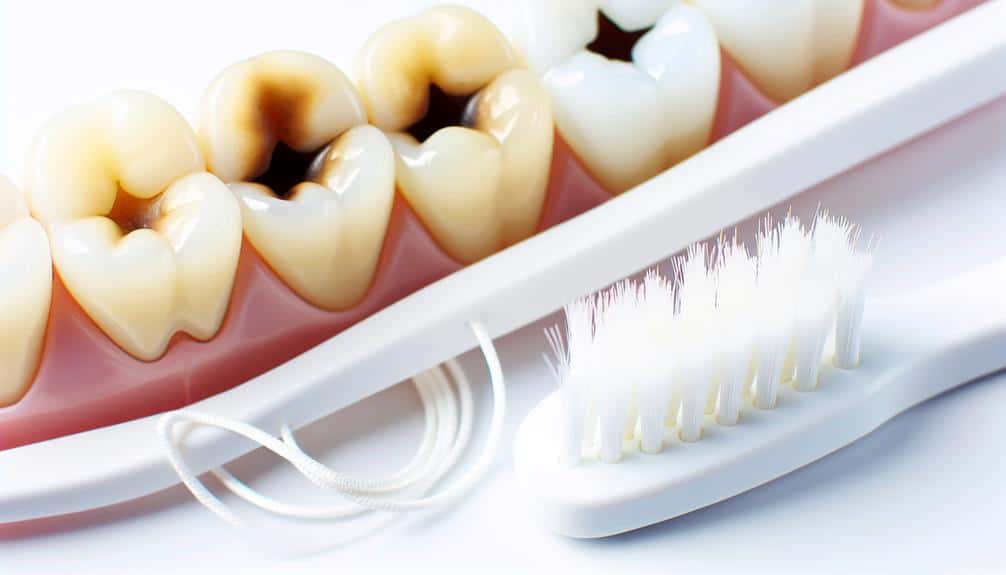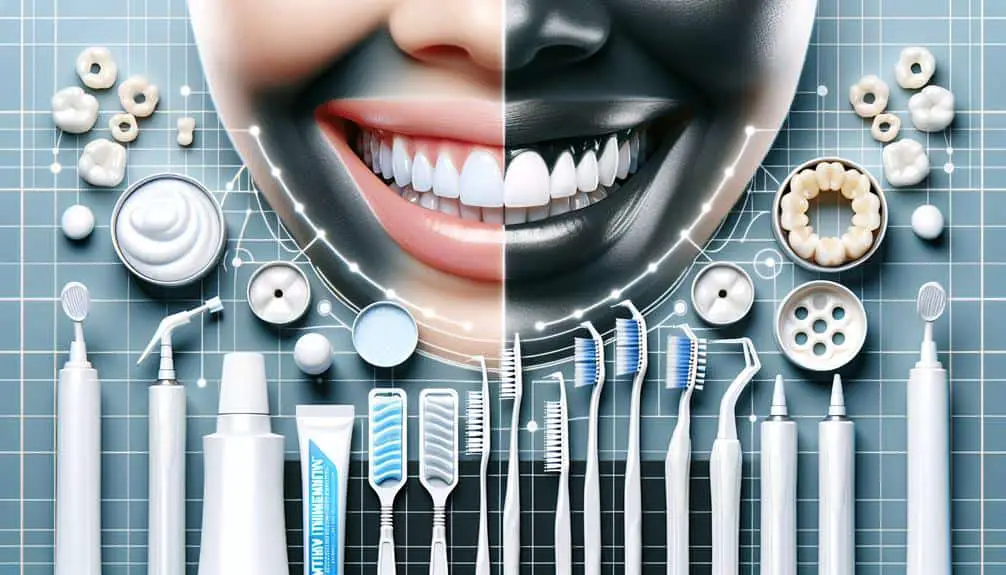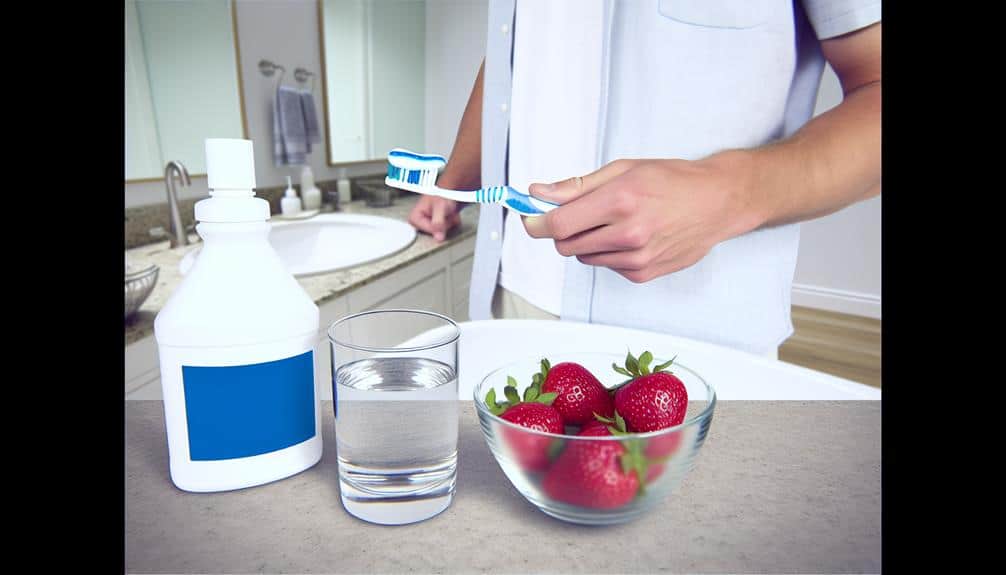Wondering why dark spots show up on your teeth? Poor oral hygiene, certain foods and drinks, and smoking are common culprits. To remove them effectively, try natural remedies like oil pulling, baking soda, and fruits with malic acid. DIY options like charcoal toothpaste and coconut oil pulling can also help. Remember, avoiding teeth-staining foods and prioritizing oral hygiene are key. For more detailed solutions and preventative tips, discover additional insights on maintaining a brighter, healthier smile.
Key Points
- Poor oral hygiene can lead to dark spots on teeth due to plaque buildup.
- Consuming staining foods and drinks like coffee can cause discoloration.
- Natural remedies like oil pulling and baking soda can help remove stains.
- Avoid tobacco products and maintain a good oral hygiene routine.
- Professional dental cleanings and whitening treatments can effectively remove dark spots.
Causes of Dark Spots on Teeth
Dark spots on teeth are typically caused by various factors such as poor oral hygiene, consumption of certain foods and beverages, and smoking. Dental hygiene plays an important role in preventing dark spots on teeth. Inadequate brushing and flossing can lead to the accumulation of plaque and tartar, which can cause discoloration. Improving your oral health routine by brushing at least twice a day and flossing daily can help prevent dark spots from forming.
Certain foods and beverages can also contribute to dark spots on teeth. Coffee, tea, red wine, and dark-colored fruits such as berries contain pigments that can stain the teeth over time. Limiting the consumption of these items or rinsing your mouth with water after consuming them can help reduce the risk of developing dark spots.
Smoking is another common cause of dark spots on teeth. Tobacco products contain tar and nicotine, which can yellow the teeth and lead to unsightly stains. Quitting smoking not only benefits your overall health but also helps maintain a bright and healthy smile.
Natural Remedies for Teeth Whitening
If you're looking to brighten your smile using natural methods, there are several effective remedies that can help whiten your teeth. Herbal remedies have been used for centuries to promote dental care and whiten teeth. One vital solution is oil pulling, where swishing coconut or sesame oil in your mouth may reduce bacteria and help whiten teeth.
Baking soda is another natural remedy that can gently scrub away surface stains when used in moderation. Additionally, fruits like strawberries contain malic acid, which may help remove stains when mashed and applied to teeth.
Maintaining good oral hygiene is important for natural teeth whitening. Brushing and flossing regularly, along with using a natural mouthwash, can prevent stains from settling on your teeth. Avoiding foods and drinks that stain teeth, like coffee and red wine, can also aid in keeping your smile bright.
DIY Whitening Toothpaste Recipes
To enhance your natural teeth whitening efforts, exploring do-it-yourself whitening toothpaste recipes can be a practical and enjoyable way to maintain a bright smile. Here are some effective methods you can try:
- Baking Soda Method: Baking soda is a common ingredient in DIY toothpaste recipes due to its mild abrasive properties that help remove surface stains on teeth. You can mix baking soda with a small amount of water to create a paste and brush your teeth gently with it.
- Charcoal Toothpaste: Activated charcoal has gained popularity for its teeth-whitening properties. You can add activated charcoal powder to your homemade toothpaste to help remove stains and toxins from the teeth.
- Coconut Oil Pulling: While not a traditional toothpaste recipe, oil pulling with coconut oil can help whiten teeth by reducing bacteria and plaque. Simply swish a tablespoon of coconut oil in your mouth for about 15-20 minutes daily.
- Hydrogen Peroxide Gel: Mixing hydrogen peroxide with baking soda or coconut oil can create a whitening gel. Use this mixture sparingly as hydrogen peroxide can be harsh on tooth enamel if used excessively.
Foods to Avoid for Whiter Teeth
Certain foods can have a negative impact on the whiteness of your teeth, making it essential to be mindful of what you consume to maintain a bright smile.
Coffee, a popular morning beverage, is notorious for causing stains on teeth due to its dark color and high acidity. To minimize coffee stains, consider reducing your consumption or using a straw to bypass direct contact with your teeth.
Another culprit for teeth discoloration is red wine, known for its deep hue and tannins that can leave stains on enamel. If you enjoy red wine, swish water in your mouth after drinking to help prevent the liquid from lingering on your teeth.
It's also advisable to wait at least 30 minutes before brushing your teeth after consuming acidic foods or drinks to avoid damaging the enamel.
Lifestyle Habits for Brighter Smiles
Maintaining good oral hygiene practices and adopting healthy lifestyle habits are key factors in achieving and maintaining brighter smiles. Here are some lifestyle habits that can help you achieve a brighter smile:
- Consistent Oral Hygiene: Brush your teeth at least twice a day and floss daily to remove plaque and prevent dark spots from developing on your teeth.
- Balanced Diet: Eat a diet rich in fruits and vegetables while limiting sugary and acidic foods that can contribute to tooth discoloration.
- Avoid Smoking and Tobacco Products: Tobacco can stain teeth and lead to dark spots, so quitting smoking can greatly improve the brightness of your smile.
- Regular Dental Visits: Schedule regular check-ups with your dentist for professional cleanings and to address any developing issues that could be causing dark spots on your teeth.
Frequently Asked Questions
Can Dark Spots on Teeth Be a Sign of a More Serious Dental Issue?
Do dark spots hint at bigger dental troubles? Your oral health is important. Regular dental checkups are essential. Dark spots may indicate decay or staining, so early intervention is crucial. Stay proactive for a healthy smile.
Are There Any Long-Term Effects of Having Dark Spots on Teeth?
To prevent long-term effects of dark spots on teeth, consider cosmetic dentistry for removal. Dark spots may impact oral health, leading to decay or gum disease if left untreated. Regular dental check-ups can identify issues early.
Can Dark Spots on Teeth Be Genetic?
Dark spots on teeth can be genetic, influenced by oral hygiene genetics and inherited dental marks. If your family has a history of such marks, it's wise to maintain good oral care habits.
How Can Dental Professionals Help in Removing Dark Spots on Teeth?
In removing dark spots on teeth, dental professionals employ advanced techniques like whitening treatments. They provide expert advice and preventive care to guarantee top-notch oral health. Trust their expertise to restore your smile's radiance.
Are There Any Specific Toothpaste Brands That Are Recommended for Removing Dark Spots on Teeth?
For dark spots on teeth, specific toothpaste brands like Crest 3D White or Colgate Optic White are recommended for effectiveness. Home remedies such as baking soda or activated charcoal can also help restore brightness naturally.



